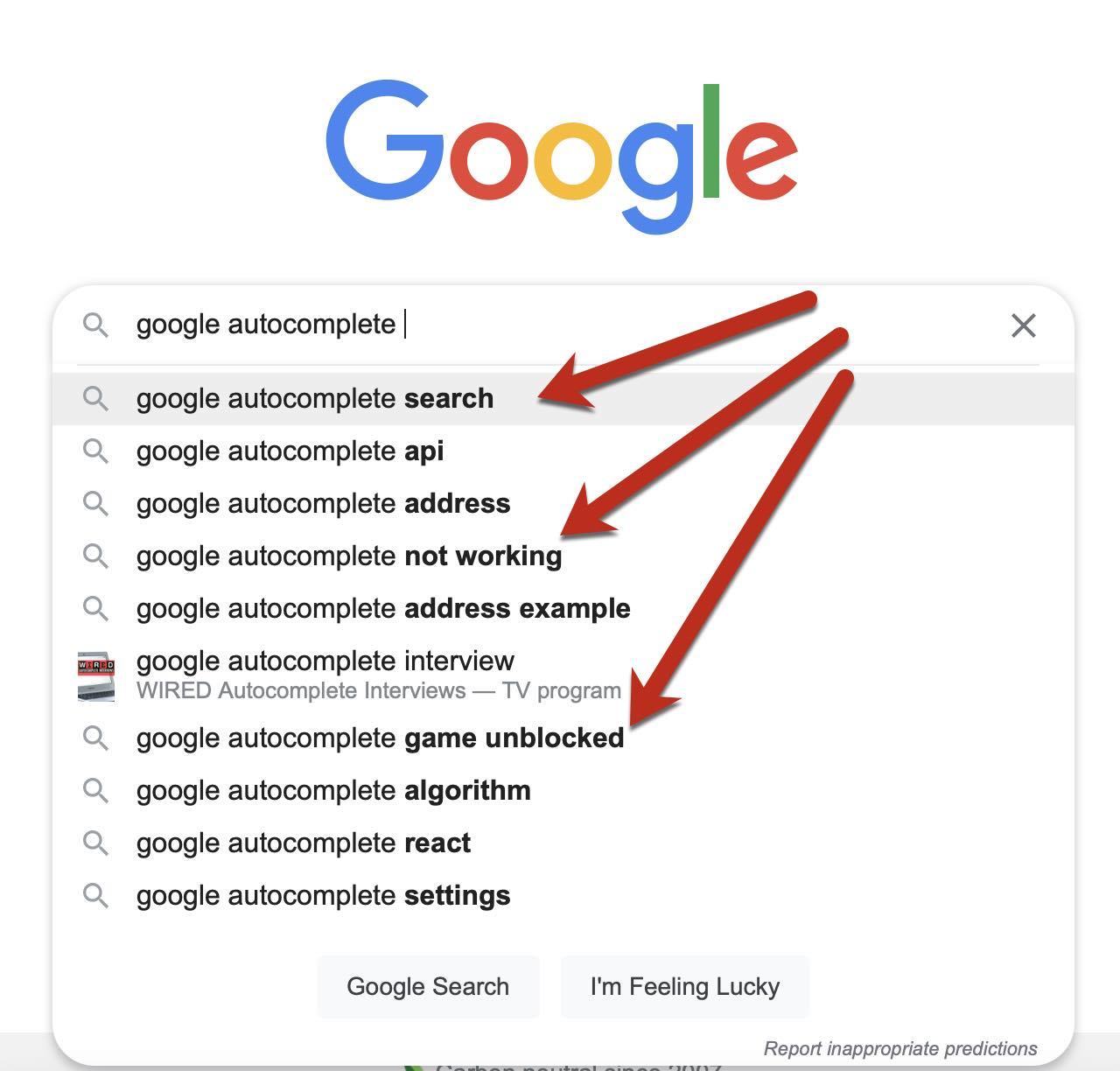Introduction Quick Start Guide SEO 101 How Search Engines Work: Crawling, Indexing, and Ranking Keyword Research On-Page SEO Technical SEO Link Building & Establishing Authority Measuring & Tracking SEO Success SEO Glossary
Now that you’ve learned how to show up in search results, let’s determine which strategic keywords to target in your website’s content, and how to craft that content to satisfy both users and search engines.

The power of keyword research lies in better understanding your target market and how they are searching for your content, services, or products.
Was Ist Eine Keyword Analyse? Und Was Bringt Sie?
In this chapter, you'll get tools and strategies for uncovering that information, as well as learn tactics that'll help you avoid keyword research foibles and build strong content. Once you uncover how your target audience is searching for your content, you begin to uncover a whole new world of strategic SEO!
Before you can help a business grow through search engine optimization, you first have to understand who they are, who their customers are, and their goals.
This is where corners are often cut. Too many people bypass this crucial planning step because keyword research takes time, and why spend the time when you already know what you want to rank for?
Keyword Research [beginner's Guide To Seo]
The answer is that what you want to rank for and what your audience actually wants are often two wildly different things. Focusing on your audience and then using keyword data to hone those insights will make for much more successful campaigns than focusing on arbitrary keywords.
Here’s an example. Frankie & Jo’s (a Seattle-based vegan, gluten-free ice cream shop) has heard about SEO and wants help improving how and how often they show up in organic search results. In order to help them, you need to first understand a little more about their customers. To do so, you might ask questions such as:
And finally — here's the kicker — how can you help provide the best content about ice cream to cultivate a community and fulfill what all those people are searching for? Asking these questions is a crucial planning step that will guide your keyword research and help you craft better content.
Keyword Tool ⚠️ Google Keyword Planner【search Free】
You may have a way of describing what you do, but how does your audience search for the product, service, or information you provide? Answering this question is a crucial first step in the keyword research process.
You likely have a few keywords in mind that you would like to rank for. These will be things like your products, services, or other topics your website addresses, and they are great seed keywords for your research, so start there! You can enter those keywords into a keyword research tool to discover average monthly search volume and similar keywords. We’ll get into search volume in greater depth in the next section, but during the discovery phase, it can help you determine which variations of your keywords are most popular amongst searchers.
Once you enter in your seed keywords into a keyword research tool, you will begin to discover other keywords, common questions, and topics for your content that you might have otherwise missed.
Keyword Optimierung: So Pushen Sie Ihr Ranking › Advidera
In the process of discovering relevant keywords for your content, you will likely notice that the search volume of those keywords varies greatly. While you definitely want to target terms that your audience is searching for, in some cases, it may be more advantageous to target terms with lower search volume because they're far less competitive.
Since both high- and low-competition keywords can be advantageous for your website, learning more about search volume can help you prioritize keywords and pick the ones that will give your website the biggest strategic advantage.

Has a free tool that can help you discover and analyze keywords. When you're ready to get your hands dirty with keyword research, give it a try!
Keyword Tool Zur Keyword Recherche
Do. With big brands, we often see the homepage ranking for many keywords, but for most websites this isn’t usually the case. Many websites receive more organic traffic to pages other than the homepage, which is why it’s so important to diversify your website’s pages by optimizing each for uniquely valuable keywords.
The higher the search volume for a given keyword or keyword phrase, the more work is typically required to achieve higher rankings. This is often referred to as keyword difficulty and occasionally incorporates SERP features; for example, if many SERP features (like featured snippets, knowledge graph, carousels, etc) are clogging up a keyword’s result page, difficulty will increase. Big brands often take up the top 10 results for high-volume keywords, so if you’re just starting out on the web and going after the same keywords, the uphill battle for ranking can take years of effort.
Typically, the higher the search volume, the greater the competition and effort required to achieve organic ranking success. Go too low, though, and you risk not drawing any searchers to your site. In many cases, it may be most advantageous to target highly specific, lower competition search terms. In SEO, we call those long-tail keywords.
Free Keyword Research Tool: Keyword Explorer
It's wonderful to deal with keywords that have 50, 000 searches a month, or even 5, 000 searches a month, but in reality, these popular search terms only make up a fraction of all searches performed on the web. In fact, keywords with very high search volumes may even indicate ambiguous intent, which, if you target these terms, it could put you at risk for drawing visitors to your site whose goals don't match the content your page provides.
Does the searcher want to know the nutritional value of pizza? Order a pizza? Find a restaurant to take their family? Google doesn’t know, so they offer these features to help you refine. Targeting “pizza” means that you’re likely casting too wide a net.

Don’t underestimate these less popular keywords. Long tail keywords with lower search volume often convert better, because searchers are more specific and intentional in their searches. For example, a person searching for shoes is probably just browsing. On the other hand, someone searching for best price red womens size 7 running shoe practically has their wallet out!
Keyword Strategy: Using Keywords In Your Campaigns
Pro can show you which keywords your pages are ranking for, their search volume, difficulty, and more. Take a 30-day free trial and see the benefits:
Discovering what questions people are asking in your space — and adding those questions and their answers to an FAQ page — can yield incredible organic traffic for your website.
Now that you’ve discovered relevant search terms for your site and their corresponding search volumes, you can get even more strategic by looking at your competitors and figuring out how searches might differ by season or location.
Best Keyword Mapping Tools For Seo
You’ll likely compile a lot of keywords. How do you know which to tackle first? It could be a good idea to prioritize high-volume keywords that your competitors are not currently ranking for. On the flip side, you could also see which keywords from your list your competitors are already ranking for and prioritize those. The former is great when you want to take advantage of your competitors’ missed opportunities, while the latter is an aggressive strategy that sets you up to compete for keywords your competitors are already performing well for.
Knowing about seasonal trends can be advantageous in setting a content strategy. For example, if you know that “christmas box” starts to spike in October through December in the United Kingdom, you can prepare content months in advance and give it a big push around those months.

You can more strategically target a specific location by narrowing down your keyword research to specific towns, counties, or states in the Google Keyword Planner, or evaluate interest by subregion in Google Trends. Geo-specific research can help make your content more relevant to your target audience. For example, you might find out that in Texas, the preferred term for a large truck is “big rig, ” while in New York, “tractor trailer” is the preferred terminology.
What Is Keyword Clustering?
In Chapter 2, we learned about SERP features. That background is going to help us understand how searchers want to consume information for a particular keyword. The format in which Google chooses to display search results depends on intent, and every query has a unique one. Google describes these intents in their Quality Rater Guidelines as either “know” (find information), “do” (accomplish a goal), “website” (find a specific website), or “visit-in-person” (visit a local business).
1. Informational queries: The searcher needs information, such as the name of a band or the height of the Empire State Building.
If you're enjoying this chapter so far, be sure to check out the keyword research episode of our One-Hour Guide to SEO video series!
Keyword Research 101
2. Navigational queries: The searcher wants to go to a particular place on the Internet, such as Facebook or the homepage of the NFL.
An important step in the keyword research process is surveying the SERP landscape for the keyword you want to target in order to get a better gauge of searcher intent. If you want to know what type of content your target audience wants, look to the SERPs!

Google has closely evaluated the behavior of trillions of searches in an attempt to